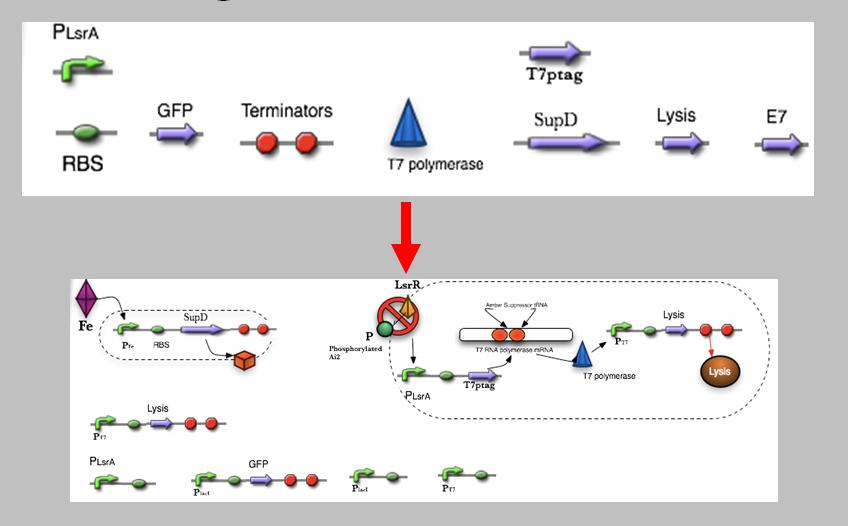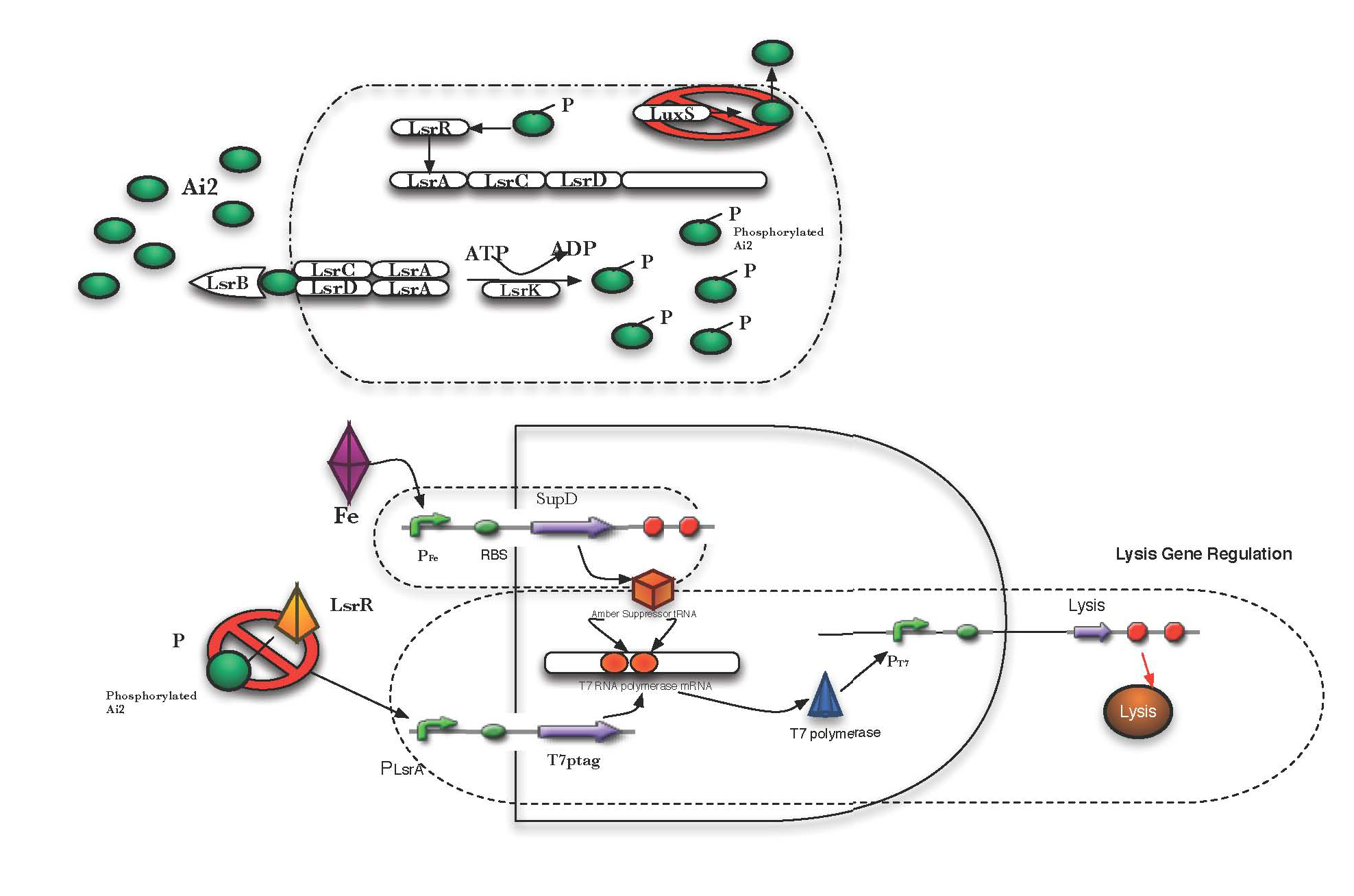Team:NTU-Singapore/Project/Approach
From 2008.igem.org
Lalala8585 (Talk | contribs) (New page: <html><link rel="stylesheet" href="http://edventure.ntu.edu.sg/bbcswebdav/users/z060022/ntu_igem.css" type="text/css"></html> <div id="header">{{User:Greenbear/sandbox/header}}</div> <d...) |
Lalala8585 (Talk | contribs) |
||
| (8 intermediate revisions not shown) | |||
| Line 1: | Line 1: | ||
| - | <html><link rel="stylesheet" href="http:// | + | <html><link rel="stylesheet" href="http://greenbear88.googlepages.com/ntu_igem.css" type="text/css"></html> |
<div id="header">{{User:Greenbear/sandbox/header}}</div> | <div id="header">{{User:Greenbear/sandbox/header}}</div> | ||
| - | <div id="body" style="margin-top: | + | <div id="body" style="margin-top:200px;width:950px;padding:5px;"> |
| + | =Methodology= | ||
| + | The NTU@iGEM team adopted a simple yet rigorous Engineering concept which can be broken down into three steps: <br> | ||
| + | |||
| + | 1) Abstraction <br> | ||
| + | |||
| + | 2) Decoupling <br> | ||
| + | |||
| + | 3) Standardization <br> | ||
| + | |||
| + | |||
==Abstraction== | ==Abstraction== | ||
| - | In abstraction, the complexity of things was reduced by creating simple parts | + | In abstraction, the complexity of things was reduced by creating simple parts before developing these parts into higher complex devices and systems |
| + | |||
| + | [[Image:NTU@iGEM_Abstraction_pic.JPG|thumb|center|1100px| Abstraction Approach]] | ||
| + | |||
| + | ==Decoupling== | ||
| + | In decoupling, each individual part was decoupled from the others, devising them without consideration for the other existing parts. Following which the fusion of different combination of these components formed a working device. | ||
| + | <br> | ||
| + | |||
| + | [[Image:NTU@iGEM_Decoupling_pic.JPG|thumb|center|800px| Decoupling Approach]] | ||
| + | <br> | ||
| + | |||
| + | ==Standardization== | ||
| + | In standardization, the Team hopes to establish standards that could be widely used and agreed. We also try to predict the function of components and compatibility of parts leading to a set of standards and protocols that could be used for future teams. | ||
| + | =Construct design= | ||
| + | ==ColE7 and Immunity production system== | ||
| + | [[Image:Production_part_NTU.jpg|center|thumb|500px|O157:H7 full detector system]] | ||
| + | |||
| + | ==O157:H7 full detector system== | ||
| + | [[Image:Detector_AND_gate.jpg|center|thumb|500px|O157:H7 full detector system]] | ||
| + | <br><br><br> | ||
| + | <html> | ||
| + | <script language=Javascript1.2> | ||
| + | <!-- | ||
| + | |||
| + | var tags_before_clock = "<b>It is now " | ||
| + | var tags_middle_clock = "on" | ||
| + | var tags_after_clock = "</b>" | ||
| + | |||
| + | if(navigator.appName == "Netscape") { | ||
| + | document.write('<layer id="clock"></layer><br>'); | ||
| + | } | ||
| + | |||
| + | if (navigator.appVersion.indexOf("MSIE") != -1){ | ||
| + | document.write('<span id="clock"></span>'); | ||
| + | } | ||
| + | |||
| + | DaysofWeek = new Array() | ||
| + | DaysofWeek[0]="Sunday" | ||
| + | DaysofWeek[1]="Monday" | ||
| + | DaysofWeek[2]="Tuesday" | ||
| + | DaysofWeek[3]="Wednesday" | ||
| + | DaysofWeek[4]="Thursday" | ||
| + | DaysofWeek[5]="Friday" | ||
| + | DaysofWeek[6]="Saturday" | ||
| + | |||
| + | Months = new Array() | ||
| + | Months[0]="January" | ||
| + | Months[1]="February" | ||
| + | Months[2]="March" | ||
| + | Months[3]="April" | ||
| + | Months[4]="May" | ||
| + | Months[5]="June" | ||
| + | Months[6]="July" | ||
| + | Months[7]="August" | ||
| + | Months[8]="September" | ||
| + | Months[9]="October" | ||
| + | Months[10]="November" | ||
| + | Months[11]="December" | ||
| + | |||
| + | function upclock(){ | ||
| + | var dte = new Date(); | ||
| + | var hrs = dte.getHours(); | ||
| + | var min = dte.getMinutes(); | ||
| + | var sec = dte.getSeconds(); | ||
| + | var day = DaysofWeek[dte.getDay()] | ||
| + | var date = dte.getDate() | ||
| + | var month = Months[dte.getMonth()] | ||
| + | var year = dte.getFullYear() | ||
| + | |||
| + | var col = ":"; | ||
| + | var spc = " "; | ||
| + | var com = ","; | ||
| + | var apm; | ||
| + | |||
| + | if (date == 1 || date == 21 || date == 31) | ||
| + | {ender = "<sup>st</sup>"} | ||
| + | else | ||
| + | if (date == 2 || date == 22) | ||
| + | {ender = "<sup>nd</sup>"} | ||
| + | else | ||
| + | if (date == 3 || date == 23) | ||
| + | {ender = "<sup>rd</sup>"} | ||
| + | |||
| + | else | ||
| + | {ender = "<sup>th</sup>"} | ||
| + | |||
| + | if (12 < hrs) { | ||
| + | apm="<font size='-1'>pm</font>"; | ||
| + | hrs-=12; | ||
| + | } | ||
| + | |||
| + | else { | ||
| + | apm="<font size='-1'>am</font>"; | ||
| + | } | ||
| + | |||
| + | if (hrs == 0) hrs=12; | ||
| + | if (hrs<=9) hrs="0"+hrs; | ||
| + | if (min<=9) min="0"+min; | ||
| + | if (sec<=9) sec="0"+sec; | ||
| + | |||
| + | if(navigator.appName == "Netscape") { | ||
| + | document.clock.document.write(tags_before_clock+hrs+col+min+col+sec+apm+spc+tags_middle_clock+spc+day+com+spc+date+ender+spc+month+com+spc+year+tags_after_clock); | ||
| + | document.clock.document.close(); | ||
| + | } | ||
| + | |||
| + | if (navigator.appVersion.indexOf("MSIE") != -1){ | ||
| + | clock.innerHTML = tags_before_clock+hrs+col+min+col+sec+apm+spc+tags_middle_clock+spc+day+com+spc+date+ender+spc+month+com+spc+year+tags_after_clock; | ||
| + | } | ||
| + | } | ||
| - | + | setInterval("upclock()",1000); | |
| + | //--> | ||
| + | </script> | ||
| + | </html> | ||
Latest revision as of 05:37, 27 October 2008
|
Contents |
Methodology
The NTU@iGEM team adopted a simple yet rigorous Engineering concept which can be broken down into three steps:
1) Abstraction
2) Decoupling
3) Standardization
Abstraction
In abstraction, the complexity of things was reduced by creating simple parts before developing these parts into higher complex devices and systems
Decoupling
In decoupling, each individual part was decoupled from the others, devising them without consideration for the other existing parts. Following which the fusion of different combination of these components formed a working device.
Standardization
In standardization, the Team hopes to establish standards that could be widely used and agreed. We also try to predict the function of components and compatibility of parts leading to a set of standards and protocols that could be used for future teams.
Construct design
ColE7 and Immunity production system
O157:H7 full detector system
 "
"




